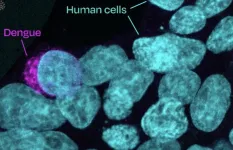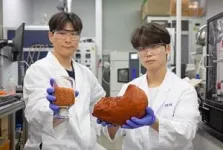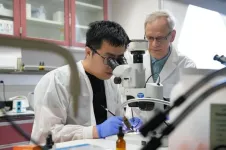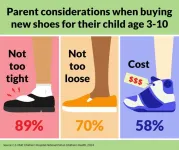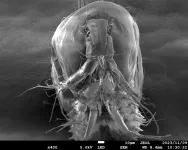(Press-News.org) KANSAS CITY, MO—July 22, 2024—Mosquito-borne viral infections once confined to tropical regions are spreading. Dengue virus infects up to 400 million people worldwide each year according to World Health Organization estimates, and no available treatments exist for this disease. Now, research from the Stowers Institute for Medical Research has uncovered surprising strategies for how dengue and hundreds of other viruses replicate in their hosts, with the potential to aid in developing novel antiviral treatments and vaccines.
Led by Stowers Predoctoral Researcher Luciana Castellano in the lab of Associate Investigator Ariel Bazzini, Ph.D., the study, published in Molecular Systems Biology on July 22, 2024, revealed that the dengue virus genome uses less efficient codons, or “vocabulary,” to make its own proteins using the host’s machinery to replicate, and spread. A codon is a sequence of three nucleotides, or “words” in the genetic code that help make proteins. The researchers found that hundreds of other viruses also use “words” in their genetic code that are less efficient in their mosquito and human hosts.
“Now that we know what dengue and other viruses use when they infect our cells, we have clues for how we may be able to help prevent these deadly diseases,” said Bazzini.
“During infection, host cells and viral invaders are at war,” said Castellano. “Like building weapons, both viruses and cells need to build proteins to fight and defend themselves.”
Dengue virus needs the proteins encoded in its single-stranded RNA genome to propagate, but the virus can’t produce them on its own. The virus must use the host cell’s protein production machinery, so the researchers hypothesized that dengue virus would use codons or “vocabulary” similar to that of mosquitos and humans.
“The genetic code is universal for all living organisms and contains 64 codons, the three-nucleotide ‘words’ of RNA, that specify the amino acids that make up proteins,” said Bazzini.
The nature of the genetic code allows for more than one codon to specify the same amino acid. Functioning like synonyms in language, codons that specify the same amino acid are called synonymous codons.
But just as each synonym is a distinct word, each synonymous codon has individual properties that can impact a cell’s efficiency for manufacturing proteins as well as the stability of RNA. In addition, a particular synonymous codon can be efficient and optimal in one species but inefficient and nonoptimal in another. This concept is called codon optimality. The Bazzini Lab studies the codon optimality code in humans and other vertebrates, and in this study, the researchers identified for the first time that the mosquito genome also follows its own optimality code.
The researchers found that dengue virus tends to use synonymous codons that are deemed less optimal in their mosquito and human hosts, contrary to their original prediction.
“We were surprised to find that dengue virus preferentially uses the host’s less efficient codons, possibly as a strategy to evade an antiviral response by the host,” said Castellano.
“Viruses accumulate mutations during infection of their hosts. We were surprised to find that mutations in the dengue virus genome toward these less efficient codons increased dengue virus fitness in both mosquito and human cells,” said Ryan McNamara, a Bioinformatics Analyst in the Bazzini Lab whose contribution was key to this work.
The team analyzed hundreds of other human-infecting viruses and found that many of them, including HIV and SARS-CoV-2, preferentially use less efficient codons relative to humans, suggesting they have evolved an “inefficient” genome as a strategy to use host cell resources in a way that benefits the virus. The conserved preference among viruses has implications to understand not only how viruses evolve but also how the host-pathogen relationship changes over time.
“Fundamentally, this work has altered how we think about the relationship between a virus and a host cell,” said Bazzini.
“In the future, we hope to better understand the mechanism by which viruses are benefitting from using these inefficient codons, and which molecules viruses may be manipulating to gain control,” said Castellano.
The Centers for Disease Control and Prevention reported that cases of dengue have doubled since just last year in the Americas, and warn of an increased risk of infection in the U.S.
“As mosquitos are spreading to broader, more global regions, we need to start thinking very seriously for how to combat dengue and other mosquito-borne viral infections,” said Bazzini.
Additional authors include Horacio Pallarés, Ph.D., from the Stowers Institute; Andrea Gamarnik, Ph.D., from Fundación Instituto Leloir-CONICET, Argentina; and Diego Alvarez, Ph.D., from Universidad Nacional de San Martín-CONICET, Argentina.
This work was funded by the National Institute of General Medical Sciences of the National Institutes of Health (NIH) (award: R01GM136849), the NIH Office of the Director (award: R21OD034161), the PEW Innovation Fund award, and institutional support from the Stowers Institute for Medical Research. The content is solely the responsibility of the authors and does not necessarily represent the official views of the NIH.
About the Stowers Institute for Medical Research
Founded in 1994 through the generosity of Jim Stowers, founder of American Century Investments, and his wife, Virginia, the Stowers Institute for Medical Research is a non-profit, biomedical research organization with a focus on foundational research. Its mission is to expand our understanding of the secrets of life and improve life’s quality through innovative approaches to the causes, treatment, and prevention of diseases.
The Institute consists of 21 independent research programs. Of the approximately 500 members, over 370 are scientific staff that include principal investigators, technology center directors, postdoctoral scientists, graduate students, and technical support staff. Learn more about the Institute at www.stowers.org and about its graduate program at www.stowers.org/gradschool.
Media Contact:
Joe Chiodo, Head of Media Relations
724.462.8529
press@stowers.org
END
Exposing dengue’s invasion strategies
Stowers scientists uncover fundamental rules for how dengue virus infects its mosquito and human hosts, providing hope for identifying therapeutic approaches
2024-07-22
ELSE PRESS RELEASES FROM THIS DATE:
Under embargo: Smell of human stress affects dogs’ emotions leading them to make more pessimistic choices
2024-07-22
Peer reviewed: Yes
Type of evidence: Observational study
Subject: Animals
UNDER STRICT EMBARGO until 10:00 hours [UK BST] / 05:00 hours [US EDT] Monday 22 July 2024
Smell of human stress affects dogs’ emotions leading them to make more pessimistic choices
Dogs experience emotional contagion from the smell of human stress, leading them to make more ‘pessimistic’ choices, new research finds. The University of Bristol-led study, published in Scientific Reports today [22 July], is the first to test how human stress odours affect dogs' learning and emotional state.
Evidence in humans suggests that the smell of a stressed ...
Blood proteins predict the risk of developing more than 60 diseases
2024-07-22
Research on thousands of proteins measured from a drop of blood demonstrates the ability of proteins to predict the onset of many diverse diseases.
The research, published today (22 July 2024) in Nature Medicine, was carried out as part of an international research partnership between GSK, Queen Mary University of London, University College London, Cambridge University and the Berlin Institute of Health at Charité Universitätsmedizin, Germany.
The researchers used data from the UK Biobank Pharma Proteomics Project (UKB-PPP), ...
Virginia Tech researchers find potential method to control mosquito populations through genetic breeding
2024-07-22
Virginia Tech researchers have found a new way to identify genetic targets useful for control of mosquito populations, potentially offering an alternative to insecticides.
Their study, published today in Communications Biology, focused on the genetic basis of species incompatibility. They crossed Ae. aegypti, a major global arboviral disease vector, and its sibling species, Ae. mascarensis, from the Indian Ocean. When offspring is crossed back with one parent, about 10 percent of the progeny becomes intersex and is unable to reproduce.
The researchers identified abnormalities in the sex determination pathways of these ...
Amsterdam UMC set to lead large-scale European study into preventing burnout due to stress among staff in and around the operating theatre
2024-07-22
On average, healthcare professionals involved in surgical procedures and care in hospitals experience more stress and burnout than other professional groups in Europe. An estimated 60% of these caregivers are showing symptoms of burnout, while up to half of nurses are considering leaving their profession. To address this, thanks to a Horizon Grant of almost 6.5 million euros, Amsterdam UMC will lead a European consortium in search of the best solutions to stress.
"Healthcare providers involved in surgical procedures are under enormous pressure. Think of surgeons, nurses, theatre assistants, anesthesiologists. They ...
National Poll: Some parents not confident their kids are wearing the right shoes
2024-07-22
ANN ARBOR, Mich. – As children grow, it may feel like they’re constantly outgrowing one clothing item essential for so many activities: their shoes.
But many parents in a new national poll acknowledge a lack of confidence in ensuring their children are wearing properly fitting shoes – which experts say is necessary to support growth and prevent injuries.
One in seven parents also say they’ve had concerns about their child’s feet or the way they walk while one in 10 parents report their child ...
Eco-friendly treatment saves squid eggs from newfound parasite
2024-07-22
Raising squid in aquaculture has been a challenge that researchers have tried to address for many decades without meaningful success. Squid are highly sensitive to changes in water flow, are vulnerable to disease, have complex life cycles and hard-to-meet food preferences, and can become aggressive towards each other, all of which make them difficult to rear. At the same time, the population of wild squid is plummeting due to overfishing and climate change, and in Japan alone, it’s estimated ...
Quit Googling and take naps to cut dementia risk, says AI expert
2024-07-22
People can reduce their risk of age-related dementia by exercising their brains properly instead of Googling, according to a leading Canadian academic.
Professor Mohamed I. Elmasry says simple daily habits such as afternoon naps, memory ‘workouts’ and not reaching for a smartphone can increase the odds of healthy aging.
His new book, iMind: Artificial and Real Intelligence (with foreword by Canadian cell biologist Dr. Aileen Burford-Mason), says the focus has shifted too far away from RI (natural, or real) intelligence in favor of ...
Duke-NUS launches LIVE Ventures, a S$20 million incubator to accelerate research commercialisation
2024-07-22
New incubator aims to tap industry experts to bridge the knowledge and funding gap to enhance bench-to-bedside success
LIVE Ventures provides up to $500,000 for high-potential academic research projects
Duke-NUS Medical School today launched LIVE Ventures, a S$20 million incubation programme designed to catalyse the commercialisation of innovative academic research. Focused on translating scientific breakthroughs into clinical applications, LIVE Ventures will provide Duke-NUS scientists conducting ...
Samuel Pepys’ fashion prints reveal his guilty pleasure: Fancy French clothes
2024-07-22
University of Cambridge media release
UNDER STRICT EMBARGO UNTIL 00:01AM (UK TIME) ON MONDAY 22ND JULY 2024
A collection of French fashion engravings offers precious new insights into the life of Samuel Pepys years after his premature final diary entry. The prints show the tailor’s son remained fascinated by the power of fashion long after he had secured wealth and status. But they also expose Pepys’ internal conflict over French style.
Most of what we know about Samuel ...
New genetic test will eliminate a form of inherited blindness in dogs
2024-07-22
Progressive retinal atrophy (PRA) is a group of inherited diseases that causes progressive degeneration of the light sensitive cells at the back of the eye. Dogs with PRA have normal sight at birth, but by the age of four or five they will be totally blind. There is no treatment.
Now a team led by the University of Cambridge has identified the genetic mutation that causes PRA in English Shepherd Dogs, and developed a DNA test for it. By identifying dogs carrying the disease before their eyesight starts to fail, this provides a tool to guide breeding decisions so the disease is not passed on to puppies.
Owners usually don’t realise their dog has PRA until it is ...
LAST 30 PRESS RELEASES:
Brainwaves of mothers and children synchronize when playing together – even in an acquired language
A holiday to better recovery
Cal Poly’s fifth Climate Solutions Now conference to take place Feb. 23-27
Mask-wearing during COVID-19 linked to reduced air pollution–triggered heart attack risk in Japan
Achieving cross-coupling reactions of fatty amide reduction radicals via iridium-photorelay catalysis and other strategies
Shorter may be sweeter: Study finds 15-second health ads can curb junk food cravings
Family relationships identified in Stone Age graves on Gotland
Effectiveness of exercise to ease osteoarthritis symptoms likely minimal and transient
Cost of copper must rise double to meet basic copper needs
A gel for wounds that won’t heal
Iron, carbon, and the art of toxic cleanup
Organic soil amendments work together to help sandy soils hold water longer, study finds
Hidden carbon in mangrove soils may play a larger role in climate regulation than previously thought
Weight-loss wonder pills prompt scrutiny of key ingredient
Nonprofit leader Diane Dodge to receive 2026 Penn Nursing Renfield Foundation Award for Global Women’s Health
Maternal smoking during pregnancy may be linked to higher blood pressure in children, NIH study finds
New Lund model aims to shorten the path to life-saving cell and gene therapies
Researchers create ultra-stretchable, liquid-repellent materials via laser ablation
Combining AI with OCT shows potential for detecting lipid-rich plaques in coronary arteries
SeaCast revolutionizes Mediterranean Sea forecasting with AI-powered speed and accuracy
JMIR Publications’ JMIR Bioinformatics and Biotechnology invites submissions on Bridging Data, AI, and Innovation to Transform Health
Honey bees navigate more precisely than previously thought
Air pollution may directly contribute to Alzheimer’s disease
Study finds early imaging after pediatric UTIs may do more harm than good
UC San Diego Health joins national research for maternal-fetal care
New biomarker predicts chemotherapy response in triple-negative breast cancer
Treatment algorithms featured in Brain Trauma Foundation’s update of guidelines for care of patients with penetrating traumatic brain injury
Over 40% of musicians experience tinnitus; hearing loss and hyperacusis also significantly elevated
Artificial intelligence predicts colorectal cancer risk in ulcerative colitis patients
Mayo Clinic installs first magnetic nanoparticle hyperthermia system for cancer research in the US
[Press-News.org] Exposing dengue’s invasion strategiesStowers scientists uncover fundamental rules for how dengue virus infects its mosquito and human hosts, providing hope for identifying therapeutic approaches
